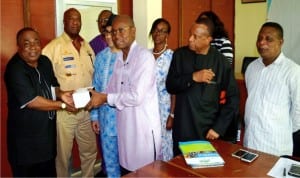Business
New Tariff: NERC Urges Calm

Port Harcorut Chamber of Commerce President, Dr. Emi Membere – Otaji presenting a gift to the zonal controller of Nigerian Export Promotion council, Mr. Mike W. Nworgu during courtesy visit.
Acting Chairman, Ni
gerian Electricity Regulatory Commission (NERC), Dr Anthony Akah, on Tuesday called for restraint among electricity consumers on the new tariff increment by the commission.
Making the appeal in an interview with newsmen in Abuja, Akah said there are multiple court cases over the new tariff increase.
He advised consumers to exercise patience until the courts give their final verdict on the cases.
He said the commission would not be hasty to do anything now until all the cases had been settled.
It would be recalled that protests trailed the new electricity tariff increment approved by NERC on February 1.
Mr Toluwani Adebiyi last year in a Federal High Court in Lagos sought for a perpetual injunction restraining NERC from implementing any upward review of electricity tariff.
Adebiyi also prayed the court that NERC should not increase tariff without significant improvement in power supply for at least 18 hours a day.
But NERC without waiting to hear the suit announced the tariff hike.
The court on February 15 ordered the Federal Government, NERC and the distribution companies to revert to the old tariff.
Akah explained that there were several processes through which the commission resolve issues that affect individuals or persons.
According to him, if any person has a complaint against the NERC or organisations in the sector, he can write to the commission and this will be resolved through public hearing.
He explained that the essence of establishing the commission was to better the lots of electricity consumers, adding that the commission will not do anything inimical to its customers.
Akah called on all parties involved in the tariff issue to join hands with the commission to build a better and robust power sector, noting that consultation could solve many problems.
He also attributed the tariff hike to the exchange of about N400 to a Dollar.
“So everything is now very expensive and many materials used in the sector are expensive and imported,’’ he said.
Business
Nigeria’s ETF correction deepens as STANBICETF30, VETGRIF30 see 50% decline in a week

Business
BOI Introduces Business Clinic

Business
Dangote signs $400 mln equipment deal with China’s XCMG to speed up refinery expansion

-
Maritime4 hours ago
Customs Declares War Against Narcotics Baron At Idiroko Border
-
Maritime4 hours ago
NIMASA,NAF Boost Unmanned Aerial Surveillance For Maritime Security
-
Maritime4 hours ago
Nigeria To Pilot Regional Fishing Vessels Register In Gulf Of Guinea —Oyetola
-
Maritime4 hours ago
NIWA Collaborates ICPC TO Strengthen Integrity, Revenue
-

 Business4 hours ago
Business4 hours agoBOI Introduces Business Clinic
-
Maritime4 hours ago
NIMASA GETS NEW MARITIME GUARD COMMANDER,ADOKI
-

 Business4 hours ago
Business4 hours agoDangote signs $400 mln equipment deal with China’s XCMG to speed up refinery expansion
-

 Politics4 hours ago
Politics4 hours agoGroup Hails Tinubu’s Swift Assent To 2026 Electoral Bill

